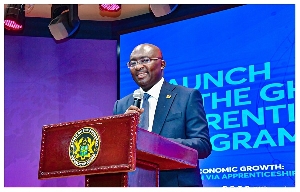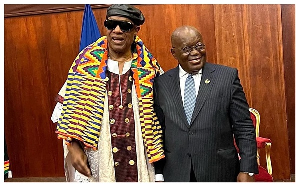- Home - News
- TWI News | TV
- Polls
- Year In Review
- News Archive
- Crime & Punishment
- Politics
- Regional
- Editorial
- Health
- Ghanaians Abroad
- Tabloid
- Africa
- Religion
- Election 2020
- Coronavirus
- News Videos | TV
- Photo Archives
- News Headlines
- Press Release
General News of Friday, 14 May 2010
Source: GNA
Azumah-Mensah calls for economic and technical support for women
Accra, May 14, GNA - Mrs. Juliana Azumah-Mensah, Minister of Women and Children's Affairs, has called for economic and technical support for women to achieve their full potential and contribute to the growth of Ghana's gross domestic product (GDP). She said though women contributed over 55 per cent of the total agricultural production, they still find it difficult to get adequate start up capital, accessing loans from the banks and technical information. Mrs. Azumah-Mensah made the call at a two-day workshop organised by the Economic Commission of Africa (ECA) and African Trade Policy Centre in Accra on Friday.
ECA, the regional arm of the United Nations in Africa, is an organisation with a mission to address the economic and social development challenges of the Member States on the continent. The workshop, under the theme: "Trade and Gender in Africa: Challenges and Opportunities", is aimed at strengthening the capacity of African countries and African Regional Economic Communities to formulate more gender responsive trade policies.
Mrs. Azumah-Mensah called for training in financial and business management skills, development of business plans, management of small scale businesses, credit management, saving mobilisation, marketing, customer relations, record keeping, costing and pricing, to enable them establish and improve in their business practices.
She called for interventions and programmes that would empower women, through trade, and to foster the development of Small and Medium scale Enterprises (SME).
The interventions according to her include expanding market access for SMEs through the facilitation and creation of innovative market schemes aimed at both domestic and external markets, facilitating and enhancing access to credit and other forms of capital for SMEs and technology improvement for SMEs through improved accessibility to research development. Mrs. Azumah-Mensah expressed optimism that participants at the workshop would make meaningful contributions towards enhancing gender mainstreaming in trade policies in Africa as well as serving as a platform for identifying common priority areas to be addressed with regard to gender and trade in Africa.
Mr. Joseph Atta-Mensah, Officer in-Charge of Regional Integration, Infrastructure and Trade Division of ECA, said women's involvement in trade had the potential to contribute significantly to household earnings and resources.
He said in spite of numerous attempts to mainstream gender into national policies, trade policies and agreements rarely took account of gender adding, the policies had differential impact on men and women that did not often translate into increased economic welfare for women. "To promote gender equitable national development through trade requires the strengthening of the productive sectors of African economies in order to attain food security, create decent work which is equitably distributed between rural and urban centres among different social groups, particularly between men and women", he said.










